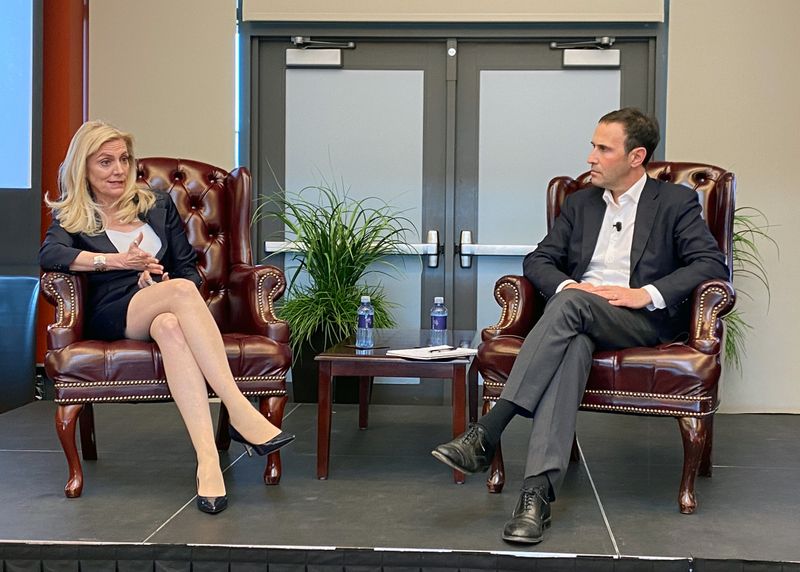 © Reuters. Federal Reserve Governor Lael Brainard speaks with the Stanford University’s business school dean Jonathan Levin in Palo Alto
© Reuters. Federal Reserve Governor Lael Brainard speaks with the Stanford University’s business school dean Jonathan Levin in Palo AltoBy Ann Saphir
PALO ALTO, Calif. (Reuters) – The Federal Reserve is looking at a broad range of issues around digital payments and currencies, including policy, design and legal considerations around potentially issuing its own digital currency, Governor Lael Brainard said on Wednesday.
Brainard’s remarks suggest more openness to the possibility of a Fed-issued digital coin than in the past.
“By transforming payments, digitalization has the potential to deliver greater value and convenience at lower cost,” Brainard said at a conference on payments at the Stanford Graduate School of Business. She did not touch on interest rates or the current economic outlook.
“But there are risks,” Brainard said, in a partial reprisal of her own and other global central bankers’ worries about the rise of private digital payment systems and currencies, including Facebook’s Libra digital currency project.
“Some of the new players are outside the financial system’s regulatory guardrails, and their new currencies could pose challenges in areas such as illicit finance, privacy, financial stability and monetary policy transmission,” she said.
Central banks globally are debating how to manage digital finance technology and the distributed ledger systems used by bitcoin, which promises near-instantaneous payment at potentially low cost.
The Fed is developing its own round-the-clock real-time payments and settlement service and is currently reviewing 200 comment letters submitted late last year about the proposed service’s design and scope, Brainard said.
But the Fed is also, she said, “conducting research and experimentation related to distributed ledger technologies and their potential use case for digital currencies, including the potential for a CBDC (central bank digital currency).”
Dozens of central banks globally are also doing such work, a recent international study showed, with China moving ahead on plans to issue a digital coin.
Less than two years ago Brainard told a conference in San Francisco that there is “no compelling demonstrated need” for such a coin.
But that was before the scope of Facebook’s digital currency ambitions were widely known. Fed officials, including Brainard, have raised concerns about consumer protections and data and privacy threats that could be posed by a currency that could come into use by the third of the world’s population that have Facebook (NASDAQ:) accounts.
At Wednesday’s conference, Brainard said the Facebook Libra project “imparted urgency” to the conversation around digital currencies. “We are collaborating with other central banks as we advance our understanding of central bank digital currencies,” she said.
With more countries looking into issuing their own digital currencies, Brainard said, that adds to “a set of reasons to also be making sure that we are that frontier of both research and policy development.”
In the United States, Brainard said, issues that need study include whether a digital currency would make the payments system safer or simpler, and whether it could pose financial stability risks, including the possibility of bank runs if money can be turned “with a single swipe” into the central bank’s digital currency.
Other issues include privacy and fraud protection, and even whether the coin would be considered legal tender.
“In the United States no less than in other major economies, the public sector needs to engage actively with the private sector and the research community to consider whether new guardrails need to be established, whether existing regulatory perimeters need to be redrawn, and whether a CBDC would deliver important benefits on net,” Brainard said.


